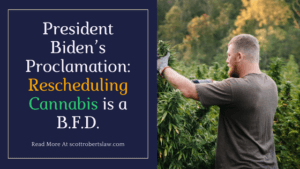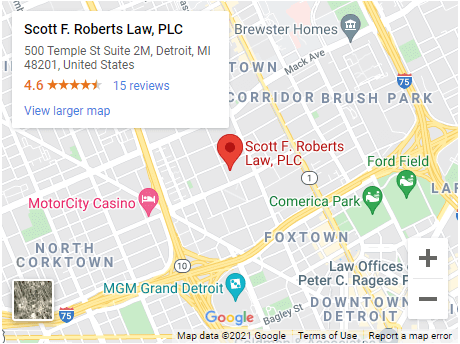The Detroit Legacy Program is one of the more controversial municipal recreational marijuana ordinance to receive city council approval in this expanding new industry. Detroit legacy applicants will want to pay close attention to the outcome of a pending court case that challenges the restrictive nature of the program’s legacy residents language.
This article will provide insight to anyone interested in establishing an adult use marijuana business in the city of Detroit.
Crucial Case Against the City – Lowe
In Lowe v. The City of Detroit, S.E. Dis. MI, Case no. 2:21-CV-10709, the plaintiff, Lowe, is one of many Detroit adult use recreational marijuana business applicants that was speculatively denied the privileges awarded to those that the ordnance deemed to have legacy status. Lowe is alleging that the adult use ordinance gives an unfair advantage to Detroit residents that receive the legacy status and is unconstitutional as a result.
Legacy Ordinance
The language of the ordnance provides marijuana licenses are to be limited and provided only an approved Detroit legacy application. Legacy Detroiters are considered to be Detroit residents that have lived in the city of 10 years or more out of the past 30 years.
Those that have been in Detroit for 15 of the last 30 years are automatically qualified as legacy Detroiters.
Those that have lived in the city 13-14 of the last 30 years are deemed approved legacy Detroiter applicants if they are low-income status and remain that way throughout the application process.
Detroit legacy applicants that have lived in Detroit for 10-12 of the last 30 years must satisfy another social equity program component, to qualify an applicant must have a controlled substance or marijuana conviction record, or a parent with a marijuana conviction record they obtained when the applicant was a minor.
The city program benefits those that it deems legacy applicants with an early license application window opening of 6 weeks, where certified legacy Detroiters get early access to the application process as well as 50% of the total licenses being reserved for legacy applicants. Additionally a marijuana conviction record, aside from selling to a minor, often receives a discount on licensing fees.
Lowe’s Status
Lowe has lived in Detroit for 11 of the last 30 years, allowing her Detroit legacy applicant status, but requiring an extra social equity component that she was unable to qualify for. Despite her mother having a cannabis conviction record, Lowe was over the age of 18 and therefore excluded from legacy Detroiter status. Neither does she have a controlled substance record or is of low-income status.
Goal of the Case
Due to her denial, Lowe is seeking a preliminary injunction against the city that restricts its ability to issue licenses until the constitutionality of the recreational marijuana ordinance. The ordinance also restricts adult use recreational marijuana licenses to 75 in Detroit, causing concerns that the over 400 Detroit legacy applicants with obtain all of the recreational marijuana licenses before non-legacy application review periods even begin.
Plaintiff Lowe’s Challenges
Equal Protection Claim
Lowe is making an equal protection claim under the MI constitution, alleging that Detroit’s ordinance purpose of favoring local merchants to address social disparities relating to marijuana policing in the city and the country is illegitimate. The MI Supreme Court has required these claims to prove that an ordinance serves no legitimate purpose and is unrelated to any productive purpose sought by the law.
Whether the social equity purpose of the ordinance is constitutional and if Detroit city council has gone about the restrictions in a logical way to achieve this purpose is exactly what must be answered by this case.
Right to Travel Claim
Separately, Lowe is bringing a claim of the protected right to travel under the MI constitution. Lowe alleges that the restrictions of Detroit’s adult use marijuana ordinance illegally restrict a Michigan resident’s right to travel within the the state.
US Constitutional Challenge
The federal challenge that brought the case to the federal district court of Southeast Michigan addresses something known as the dormant commerce clause of the constitution. By having a federal court hear the case, Lowe is hoping a higher priority is placed upon interstate commerce and free movement of capital within the country.
Dormant Commerce Clause
The third clause of the US Constitution establishes the power of congress to regulate the commerce or trade with other nations and within the states. What is not stated in this clause is that states also have the power to regulate trade between themselves, since it is not stated, it is held that states do not have the power to regulate interstate trade.
This is known as the dormant commerce clause: the fact that states cannot control the trade between them means that they cannot create discriminatory policies against other states when it comes to commerce opportunity. Plaintiff Lowe alleges that Detroit’s Legacy Program does just that in how the program restricts the ability of a non-Michigander and therefore a non-Detroiter to enter into the commerce of the city that is the cannabis industry.
City of Detroit Defense
Legitimate Public Purpose
The city council defends against the allegations under the contention there is a legitimate local public purpose served by the structure of the Legacy Program and it is therefore the right of the city to have it in place. It’s an assumption that laws are constitutional when they are passed, so the plaintiff Lowe must prove that there is either no legitimate public purpose served by the legacy program, or that if there is a purpose, the way the program is structured is unrelated to that purpose.
The city claims the Legacy Program is directly related to the legitimate governmental purpose of the MRTMA, the same act that legalized recreational marijuana in Michigan: to reverse the disproportionately harmful impact of federal drug policies and enforcement actions.
Policy Execution
Despite that being an accepted purpose of adult use recreational cannabis programs, Detroit’s city council may have miscalculated in how it executed the policy. For instance, the policy reserves 50% of the total 75 adult use licenses for legacy applicants but provided no cap to them either. This fact combined with the over 400 legacy applicants with early window access, when only their applications are reviewed, could easily mean all of the adult use licenses being issues before non-legacy license applicants even have a chance to apply.
Latest Court Decision
The latest action in the case was a motion for preliminary injunction from plaintiff Lowe against the city to stop them from issuing any licenses for recreational marijuana businesses. The plaintiff urges the court to stop the city from issuing licenses to legacy Detroiters under a policy that is likely unconstitutional. The court was swayed by Lowe’s argument and has granted the motion to stop the comity from issuing anymore licenses.
This has obviously stalled an already delayed process of issuing licenses for marijuana businesses in the city, but the court decided it is better to stop the process now and determine if the policy is even constitutional. If the policy is deemed unconstitutional and the city has to rescind the licenses its already granted to legacy Detroiters, it is probably a good idea to stop issuing them anyways.
What’s Next
This injunction was granted by the court on June 17th, 2021 and nothing further has been scheduled. The outcome of this case will decide the fate of the Detroit Legacy Program, at least in its current structure. If the policy is deemed to be unconstitutional, the Detroit city council will likely amend it to better serve the legitimate public purpose that it is meant to.
Regardless, the priority of the court and litigants alike should be to resolve the manner as quickly as possible so that Detroit may start granting licenses again and begin reaping the municipal benefits of the cannabis industry. As soon as this happens, the Michigan cannabis attorneys of Scott Roberts Law Firm will be ready to assist anyone interested in pursuing cannabis business opportunities within the city.




